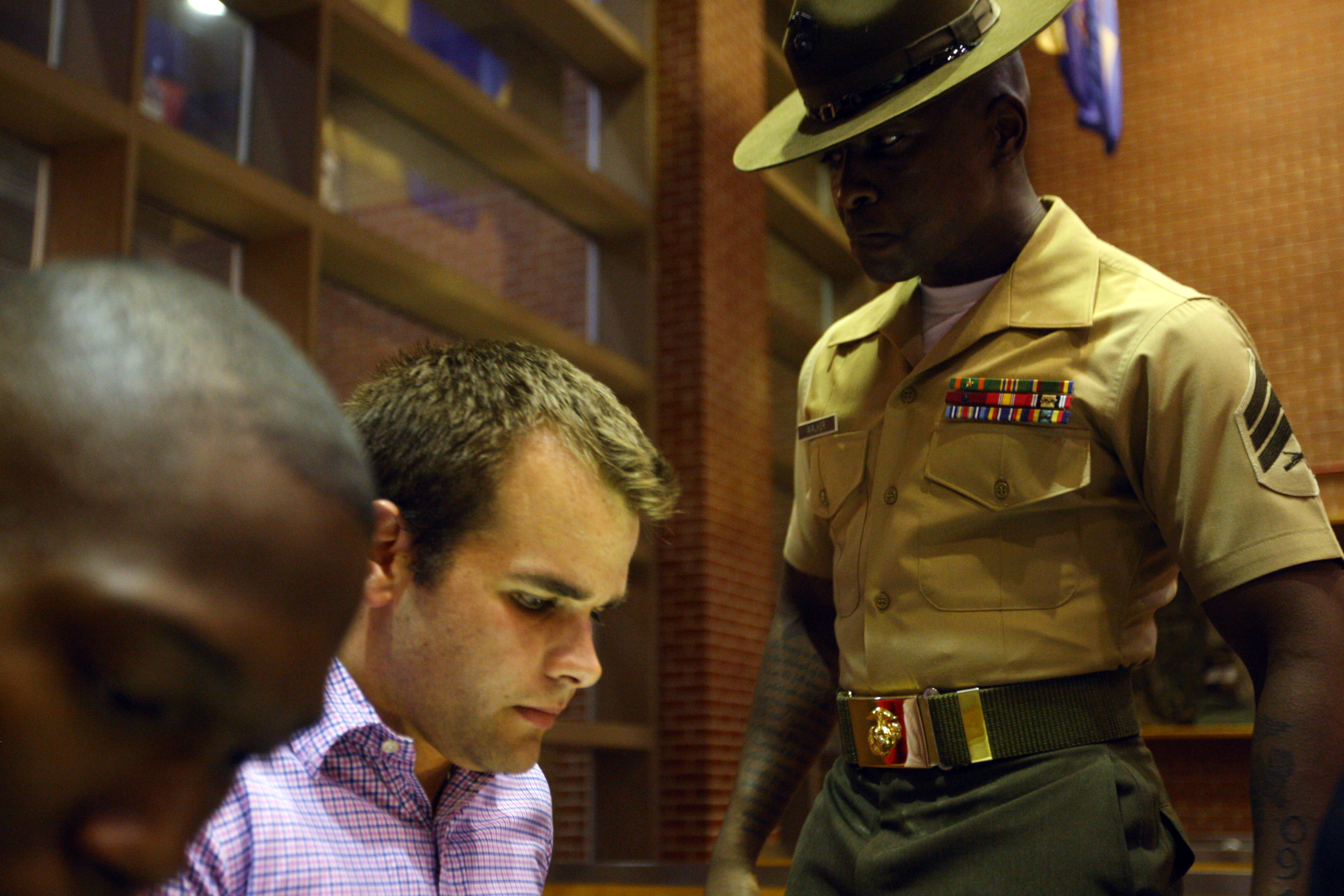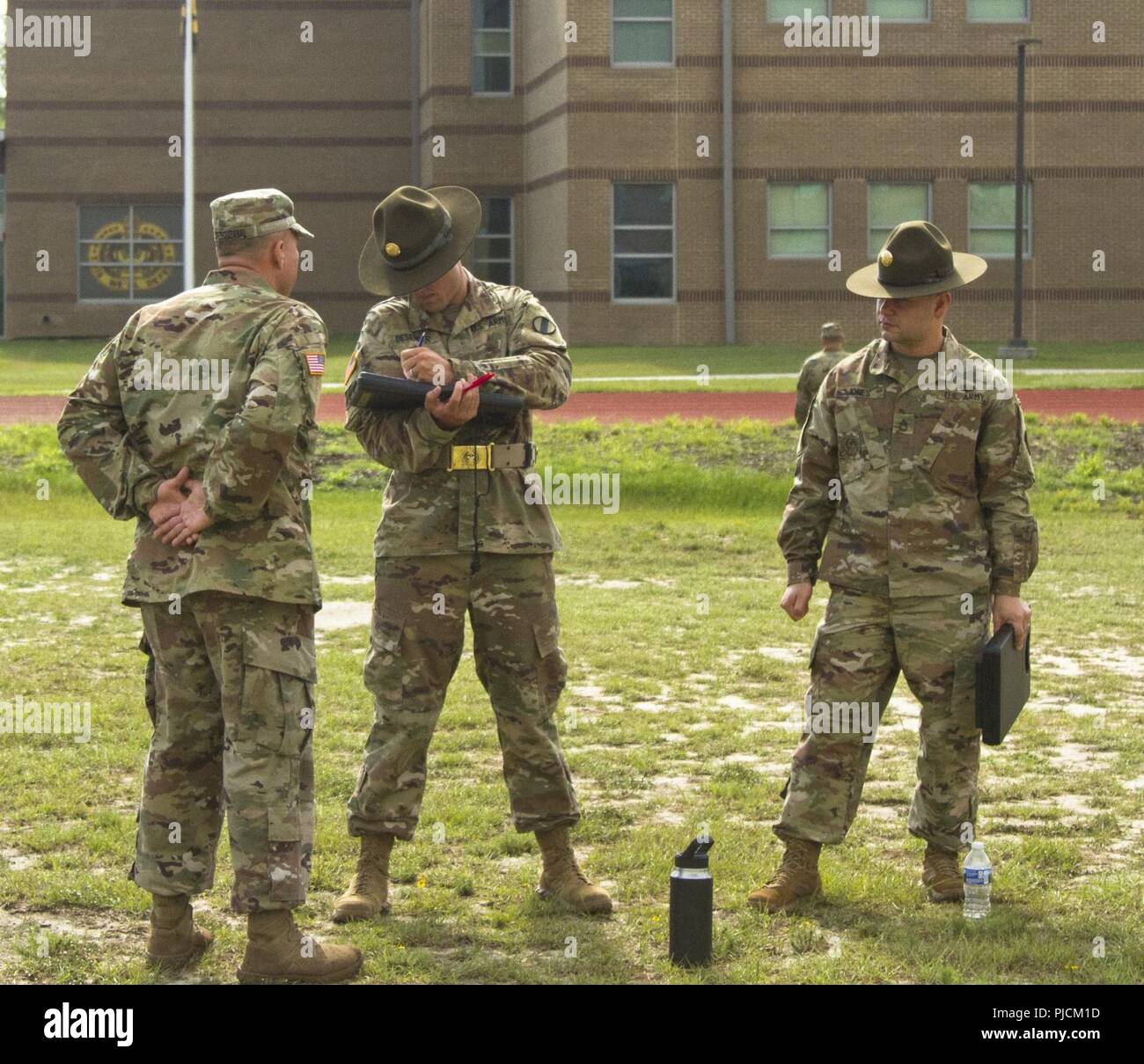To become a drill sergeant, you must meet the eligibility criteria, complete training at the drill sergeant academy, and possess leadership skills. Are you interested in becoming a drill sergeant?
If so, this article will guide you through the process of achieving this coveted position. Drill sergeants are highly respected individuals who play a crucial role in training new recruits in the military. They are responsible for instilling discipline, physical fitness, and military knowledge in the soldiers under their command.
To qualify as a drill sergeant, you must first meet the eligibility requirements, which typically include several years of military service and a recommendation from your commanding officer. Once eligible, you will need to complete rigorous training at the drill sergeant academy, where you will acquire the necessary skills and knowledge to excel in this role. Additionally, possessing strong leadership qualities is a must in order to effectively guide and mentor your recruits.
1. Understanding the Role of a Drill Sergeant
Becoming a drill sergeant is an honorable and demanding career path that requires dedication, discipline, and a deep understanding of the role. As a drill sergeant, you are responsible for shaping and molding the next generation of soldiers, instilling in them the values of teamwork, discipline, and leadership. In this section, we will explore the duties and responsibilities as well as the qualifications and requirements to become a drill sergeant.
1.1 Duties and Responsibilities of a Drill Sergeant
A drill sergeant holds a crucial position in the military, leading and training new recruits through the rigorous basic training process. They are the embodiment of discipline and serve as mentors and role models for the recruits. Here are some key duties and responsibilities of a drill sergeant:
- Providing instruction and guidance on military policies, procedures, and regulations to new recruits.
- Teaching basic combat skills, including marksmanship, physical fitness, and tactical maneuvers.
- Instilling discipline, respect, and a sense of duty in the recruits.
- Motivating and inspiring recruits through challenging and physically demanding training exercises.
- Assessing the progress and performance of recruits and providing feedback for improvement.
These responsibilities require drill sergeants to possess strong leadership skills, effective communication abilities, and the ability to remain calm and composed under pressure.
1.2 Qualifications and Requirements
Becoming a drill sergeant is a prestigious position that requires candidates to meet certain qualifications and requirements. Here are some essential criteria for aspiring drill sergeants:
| Qualifications | Requirements |
|---|---|
| Achieve the rank of Sergeant (E-5) or above | A minimum of four years of active military service |
| Complete the Basic Noncommissioned Officer Course (BNCOC) | Meet the physical fitness and medical standards |
| Demonstrate strong leadership abilities | Pass a selection process and interview board |
| Possess excellent communication and instructional skills | Maintain a clean military record with no serious disciplinary issues |
Additionally, drill sergeants go through a challenging and rigorous certification process, which includes attending the Drill Sergeant Academy. This training ensures that they are equipped with the necessary skills and knowledge to effectively train and lead new recruits.
Understanding the role of a drill sergeant is crucial for those considering a career in this field. By comprehending the duties, responsibilities, qualifications, and requirements, aspiring drill sergeants can better prepare themselves for the demanding and rewarding journey ahead.

Credit: www.marinecorpstimes.com
2. Building the Necessary Skills and Knowledge
To become a drill sergeant, it is important to build the necessary skills and knowledge. This can be achieved through rigorous training programs, gaining expertise in military tactics, leadership, and effective communication. Developing physical fitness, mental resilience, and discipline are also key aspects in this journey.
Becoming a drill sergeant in the military requires a combination of physical fitness, discipline, leadership, and knowledge of military training. In order to excel in this role, aspiring drill sergeants must focus on developing these essential skills and gaining the necessary knowledge. Let’s explore each of these aspects in more detail.2.1 Physical Fitness and Discipline
Physical fitness and discipline are the foundation of drill sergeant training. These qualities not only demonstrate your personal commitment to the role but also set the standard for your recruits. As a drill sergeant, you will be expected to lead by example and inspire your recruits to push themselves to their physical limits. Achieving and maintaining a high level of physical fitness is crucial, as it allows you to endure the demanding physical requirements of military training. Regular exercise, including strength training, cardiovascular workouts, and endurance exercises, will help you improve your stamina and overall fitness level. Besides physical fitness, discipline is equally important. Your ability to adhere to strict schedules, follow regulations, and maintain a professional demeanor will earn you the respect of your recruits. This discipline will also help you set expectations, enforce standards, and ensure a productive training environment.2.2 Leadership and Communication
Effective leadership and communication skills are essential for drill sergeants. As a leader, you will be responsible for guiding and motivating recruits through their military journey, instilling in them the knowledge and values necessary for success. Strong leadership skills include the ability to inspire, guide, and mentor others. You must lead by example, demonstrating integrity and professionalism. Being a drill sergeant requires making tough decisions and providing clear direction to your recruits. Communication is equally vital. Drill sergeants must be able to articulate instructions clearly and confidently, ensuring that recruits understand and follow them. Effective communication helps build trust, fosters teamwork, and ensures that your recruits are equipped with the information they need to excel.2.3 Knowledge of Military Training
Possessing a solid understanding of military training is crucial for any aspiring drill sergeant. You will be responsible for teaching recruits various skills, techniques, and procedures, as well as ensuring their safety during training exercises. To build this knowledge, immerse yourself in military training materials and stay updated on the latest training practices and tactics. Familiarize yourself with relevant field manuals, training programs, and regulations. Stay informed about changes in training techniques and adapt your approach accordingly. By continuously expanding your knowledge of military training, you will become a valuable resource for your recruits, allowing you to effectively teach and prepare them for their future roles in the military. Remember, building the necessary skills and knowledge to become a drill sergeant is a continuous journey. Continuous self-improvement, dedication, and a passion for teaching will pave the way for a successful career as a drill sergeant.3. Gaining Experience and Training
Once you have met the basic eligibility requirements and passed the selection process, you need to gain the necessary experience and training to become a drill sergeant. This involves a combination of basic training, military experience, attending drill sergeant school, and shadowing experienced drill sergeants.
3.1 Basic Training and Military Experience
To become a drill sergeant, it is essential to have a strong foundation in basic training and military experience. Basic training is the initial training that all recruits undergo to learn the fundamentals of military service. During basic training, recruits are taught discipline, physical fitness, and military skills. This training is crucial as it prepares individuals for the demanding role of a drill sergeant.
Additionally, gaining military experience by serving in the armed forces allows you to develop a deep understanding of military procedures, customs, and protocols. This experience provides valuable insight into the challenges faced by soldiers and the demands of military life.
3.2 Attending Drill Sergeant School
Attending Drill Sergeant School is a major step towards becoming a drill sergeant. This specialized training program is designed to equip candidates with the necessary skills and knowledge to effectively train and shape recruits. At Drill Sergeant School, candidates receive intensive instruction on leadership, physical fitness, weapons handling, drill and ceremony, and teaching techniques.
During this training, aspiring drill sergeants learn how to effectively motivate and inspire recruits, instill discipline, and maintain a high standard of performance. They also receive training in conflict resolution and how to manage stressful situations. Successful completion of Drill Sergeant School is a prerequisite for becoming a drill sergeant.
3.3 Shadowing Experienced Drill Sergeants
Shadowing experienced drill sergeants is an invaluable part of the training process. By observing seasoned drill sergeants in action, candidates gain valuable practical experience and learn firsthand the techniques and methods used to train and mold recruits. This hands-on experience allows aspiring drill sergeants to witness the challenges and rewards of the job.
During the shadowing period, candidates get the opportunity to assist in various training activities, such as physical fitness exercises, weapons drills, and classroom instruction. This immersive experience helps them develop their leadership and instructional skills, while also building confidence and familiarity with the drill sergeant role.
By combining basic training, military experience, attending Drill Sergeant School, and shadowing experienced drill sergeants, aspiring individuals are prepared to take on the demanding role of a drill sergeant. The experience gained through these training avenues allows drill sergeants to effectively train and guide recruits, shaping them into capable and disciplined soldiers.

Credit: www.7af.pacaf.af.mil
4. Excelling as a Drill Sergeant
Becoming a drill sergeant is not just about acquiring the necessary skills and knowledge; it’s also about excelling in your role and making a lasting impact on your trainees. Here are some essential aspects to focus on in order to excel as a drill sergeant:
4.1 Building Rapport with Trainees
Building a strong rapport with your trainees is crucial for creating a positive learning environment. Approachability and empathy are key attributes that will help you connect with your soldiers. By actively listening to their concerns and addressing them with respect, you foster trust and enhance their willingness to learn and grow.
4.2 Motivating and Inspiring Soldiers
Motivation is a driving force in the military, and as a drill sergeant, it is your responsibility to inspire soldiers to reach their full potential. Lead by example by demonstrating dedication, discipline, and a strong work ethic. Recognize and praise their achievements, provide constructive feedback, and set clear expectations to keep them focused and motivated.
4.3 Adapting to Changing Situations
In the military, situations can change rapidly, and it’s important for drill sergeants to be adaptable. Problem-solving skills and the ability to think on your feet are critical attributes to possess. Stay calm under pressure, remain flexible, and quickly adjust your training methods to effectively address any unexpected challenges that may arise.
4.4 Continuing Professional Development
As a drill sergeant, your commitment to personal growth and development should never waver. Pursuing opportunities for continuing education and staying updated with the latest techniques, technologies, and policies is essential. Attend relevant workshops, seminars, and training programs to enhance your skills and knowledge, and share these newfound insights with your trainees.

Credit: www.alamy.com
Conclusion
Becoming a drill sergeant requires dedication, resilience, and a strong sense of leadership. By following the steps outlined in this blog post, you can start your journey towards this honorable and challenging role in the military. Remember to prioritize physical fitness, develop effective communication skills, and embrace continuous learning.
With the right mindset and determination, you can achieve your goal and make a difference in the lives of those you train. Start today and begin your path to becoming a drill sergeant.
